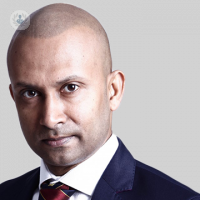What should happen in your rhinoplasty assessment
Escrito por:It’s not every day you let a surgeon near your nose. So it’s natural to want to make sure you’re picking the very best surgeon using the latest and safest tools. What many people don’t realise is that a lot of the important work in fact happens before the procedure. We asked leading ENT and facial plastic surgeon Mr Anil Joshi what a proper pre-surgical assessment should look like to achieve the best results.

A systematic rhinoplasty assessment is important for a successful rhinoplasty, but it’s also about preparing the patient for surgery and deciding on what aftercare they need. A good diagnosis looks at both functional aspects and aesthetic aspects.
Clinical assessment
We start with a clinical assessment.
Symptoms we pay close attention to include any nasal obstruction, and features suggestive of rhinitis or rhinosinusitits – that includes nasal blockage, nasal discharge, sneezing, changes in the sense of smell, and headaches.
We also look at the patient’s past medical history. In particular, we document any history of trauma to the nose and face in general, along with any history of the use of recreational drugs.
We then proceed towards carrying out tests to look at the inside of the nose. These include an anterior rhinoscopy and a nasendoscopy to analyse the septum, the nasal cavities - with any presence of mucal pus and polyps, the turbinates, strength of internal and the external nasal valves and the postnasal space.
Lastly, the examination includes analysis of the nose fully and its harmony with the full face, observing it from all angles.
Imaging and further testing
We always send the patients for clinical photographs for documentation purposes, as well as to analyse the nose before, during and after surgery. These photographs are taken in various views and include fontal, the profile or the side, with or without smiling, three-quarter, basal and birds-eye views.
Where necessary, we can investigate functional problems with imaging (such as a CT scan) and allergy testing.
Pre-surgical consultation
Finally, we hold a pre-surgical consultation to address the patient’s ideas, expectations and concerns. We will talk about the surgical plan in detail and also provide this in writing. Here it is important to discuss the pros and cons of the surgery, and its risks and benefits. Providing we have written consent from the patient, we have done everything necessary to prepare for the surgery.



